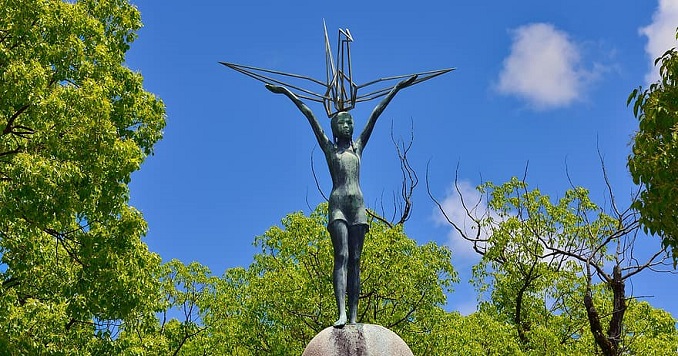Statement on the 75th Anniversary of the Bombings of Hiroshima and Nagasaki
In the following statement commemorating the 75th anniversary of the atomic bombings of Hiroshima and Nagasaki, chair of the Soka Gakkai Council on Peace Issues, Yoshiki Tanigawa, reaffirms the Soka Gakkai’s commitment to work for the complete elimination of nuclear weapons and urges ratification of the Treaty on the Prohibition of Nuclear Weapons.

Tokyo, Aug 1, 2020: This summer, the world will mark the 75th anniversary of the atomic bombings of Hiroshima on August 6 and Nagasaki on August 9, 1945. The Soka Gakkai has long been engaged in a campaign to abolish nuclear weapons. These efforts trace their original impetus to the 1957 declaration by our organization’s second president, Josei Toda, calling for the abolition of nuclear weapons as a threat to humankind’s right to life. They are based on the conviction of Daisaku Ikeda, third president and heir to Toda’s spiritual legacy, that nuclear weapons are an absolute evil. On this occasion, we, the members of the Soka Gakkai, renew our pledge to exert all efforts for the complete elimination of nuclear weapons.
Our world today is wracked by extreme tensions. In recent years, there are signs that a nuclear arms race among the nuclear-weapon states is again intensifying. At the same time, the global spread of the novel coronavirus has demonstrated that military force is incapable of resolving global challenges, compelling us to confront the question of what constitutes authentic security for human beings. Faced with these threats, it is clear that humankind stands at a crossroads regarding securing our right to life.
This year, which further coincides with the 75th anniversary of the founding of the United Nations and the 50th anniversary of the entry into force of the Treaty on the Non-Proliferation of Nuclear Weapons (NPT), marks a critical juncture in the field of disarmament. The very first resolution adopted by the UN General Assembly in 1946 clearly called for the elimination of nuclear weapons. It is of momentous and historic significance that at long last, in 2017, in response to the raised voices of people throughout the world, the Treaty on the Prohibition of Nuclear Weapons (TPNW) was adopted by the UN, and that it is now moving toward gaining the ratification by 50 countries necessary for entry into force. More than anything, the TPNW embodies the courageous voices of the world’s hibakusha—the survivors of the bombings of Hiroshima and Nagasaki and of the production and testing of nuclear weapons—insisting that no one else ever suffer what they have endured.
Based on a recognition of the inhumane nature of nuclear weapons, the TPNW prohibits, without exception, all nuclear weapon-related activities—from their development to their possession and use. The treaty complements the NPT, which has long been recognized as the cornerstone of the international nuclear disarmament regime. We call for the early entry into force of the TPNW and the widespread universalization of its spirit. It is our strong hope that nuclear-weapon states will fulfill their obligation to achieve nuclear disarmament as stipulated in the NPT.
At this deeply significant juncture, the government of Japan, the only country to have suffered atomic bombings during war, should announce its readiness to consider participation in the TPNW, thus positively shaping the discourse on the elimination of nuclear weapons within the international community.
The teachings of Buddhism express the confidence that, “When great evil occurs, great good follows.” With each individual envisioning a future world free from nuclear weapons, we must make the current crisis a turning point, transforming division into unity as we advance toward the realization of that vision. As heirs to the vow of our mentor Daisaku Ikeda to realize peace—in turn the legacy of his mentor Josei Toda—we renew our determination to promote grassroots awareness-raising activities in order to build a growing popular solidarity for a world without nuclear weapons.







